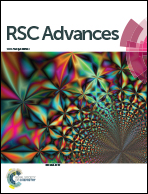The effects of the main components of seawater on the tribological properties of Cu–9Al–5Ni–4Fe–Mn alloy sliding against AISI 52100 steel
Abstract
A high strength and wear-resistance nickel-aluminum bronze alloy was successfully prepared by hot-pressing sintering. The tribological performances of it sliding against AISI 52100 steel were studied in distilled water, seawater, divalent salt solutions and monovalent salt solutions. The effects of the main components of seawater on the tribological properties were first investigated. The results show that Cu–9Al–5Ni–4Fe–Mn alloy has a lower friction coefficient and wear rate in seawater and divalent salt solutions. The Cl− and SO42− adsorbed by the surface can accelerate corrosion and promote the formation of Cu2O, Al2O3, FeOOH and Fe2O3, which has an influence on the tribological performances. The distribution of CaCO3 and Mg(OH)2 on the surface also plays an important role in the reduction of the friction coefficient and wear rate. In addition, many substances transfer from the alloy to the steel surface and form a transfer layer during the friction process.


 Please wait while we load your content...
Please wait while we load your content...